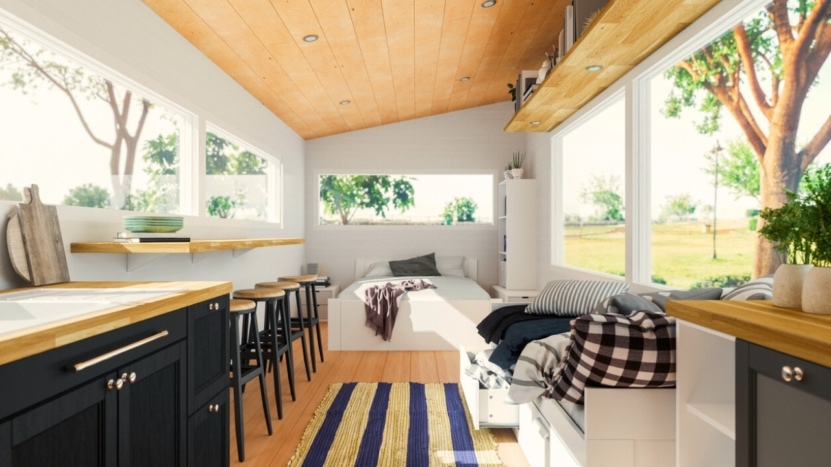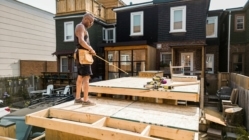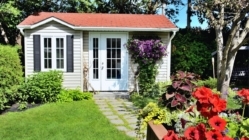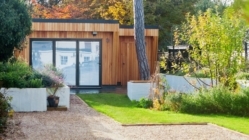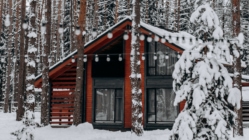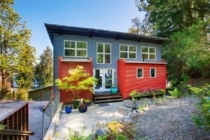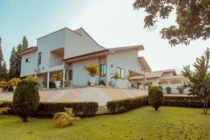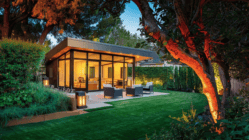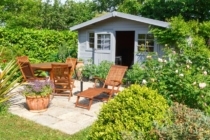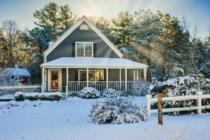Are you intrigued by the potential of adding more living space and value to your property? Building an ADU (Accessory Dwelling Unit) might be the perfect solution. Also known as granny flats, in-law suites, or backyard cottages, ADUs offer homeowners a fantastic opportunity to create flexible living spaces that can serve multiple purposes. Whether you dream of generating passive income from a rental unit, accommodating extended family, or establishing a dedicated home office, an ADU presents endless possibilities.
This comprehensive guide will walk you through everything you need to know about building an ADU. From exploring different ADU designs to navigating permits and finding the right contractors, we’ll cover it all.
What Are the Different Types of ADUs Available?
ADUs come in all shapes and sizes, accommodating various budgets, needs, and preferences. Here’s a breakdown of some popular options:
- Detached ADUs: These standalone structures are a fantastic way to maximize your property’s usable space. They offer increased privacy for both the primary residence and the ADU.
- Attached ADUs: Perfect for seamless integration with your main house, they often involve converting a garage or adding a new wing to your home.
- ADU Conversions: Transform an existing garage, basement, or attic into a functional ADU, often a cost-effective solution.
- Prefab ADUs: Pre-built in a factory and delivered to your site, these units offer speed and affordability.
- Custom ADUs: Get complete control over design and finishes for the ultimate bespoke ADU.
For those seeking a quick and cost-effective solution, prefabricated ADUs (also known as prefab ADUs) are a standout choice. These units are constructed off-site in a factory setting and then transported to your property, ready for installation. This approach not only cuts down on construction time but also offers a range of designs, from sleek studios ideal for a personal retreat or guest lodging to more spacious two-bedroom units perfect for accommodating relatives or renters. A few standout choices for prefab ADUs are Dvele, Boxabl, or Adobu.
On the other hand, opting for a custom ADU allows for a deeper level of customization. This route gives you the freedom to dictate every aspect of the design, from window placements to the size and shape of rooms, ensuring that every square inch of your ADU is tailored to your specific needs and preferences.
Whether you lean towards a prefab ADU for its convenience and predictability or prefer the tailor-made experience of a custom unit, the choice ultimately hinges on your budget, desired timeline, and the degree of customization you wish to achieve.
Finding ADU Builders and Contractors: How Do I Select the Best Team for My Project?
The success of your ADU project largely depends on partnering with the right builders and contractors, those with a deep understanding and experience in ADU construction.
Choosing the right ADU builders or contractors is crucial for a successful project. Below are a few tips for finding the right fit for your project:
- Focus on Experience: When evaluating potential partners, focus on their ADU-specific portfolio to assess their capability in handling such projects. Look for professionals with a proven track record of building ADUs. This specialized experience is invaluable.
- Recommendations and Reviews: Ask for referrals from friends, neighbors, or real estate agents. Also, check online reviews for insights into a builder’s reputation. Always check references to gain insights into their communication style and problem-solving skills, ensuring they’re aligned with your project goals.
- Communication is Key: Choose a team that clearly explains the construction process and is transparent about costs, timelines, and potential challenges.
- Ask about Permits and Zoning: Ensure your chosen builder is well-versed with local regulations and can navigate the permitting process smoothly. Discussions about their approach to permits, zoning, budget management, and timelines are crucial.
- Ask About Local Knowledge: Your location may have some quirks, so be sure to select an ADU builder who is very familiar with the nuances of your city or local area. This could include the permits, terrain, soil, costs, and more.
A good starting point is seeking recommendations from friends, family, or neighbors who have embarked on similar projects. Expanding your search online to platforms that list local builders with reviews and ratings can also offer valuable insights.
NOTE: If you need a referral for an ADU builder or ADU contractor near you, please reach out to us. At JVM Lending, we have numerous relationships with reputable ADU builders across the U.S. that we can introduce you to.
How Can I Choose the Best ADU Design for My Needs?
Selecting the right ADU design is a delicate balance between aesthetics and functionality. Consider how your new ADU will harmonize with your main house and fit into your property’s overall layout. Prefab options can simplify this process, offering pre-designed models that merge efficiency with style. However, custom designs allow for a deeper level of personalization, tailoring every detail to your specific requirements.
Climate considerations and environmental factors should also guide your design choice, ensuring your ADU is comfortable, energy-efficient, and integrates well with your outdoor spaces.
What Steps Are Involved in Creating ADU Plans?
The ADU planning process begins with defining your vision for the space. Here’s how to get organized:
- Determine Your Goals: Clearly define what you want to achieve with your ADU – whether it’s creating an independent living area, a rental opportunity, or a functional home office. Knowing your purpose will streamline the decision-making process.
- Consult with Professionals: Consult your chosen ADU builder or contractor, along with architects, designers, or design-build firms who specialize in ADUs. They’ll bring your vision to life while ensuring compliance with local zoning and building regulations.
- Explore Financing Options: Research ways to fund your ADU project, from home equity loans to specialized ADU financing programs. Lenders like JVM Lending specialize in ADU financing and can assist you with any financing needs.
- Be Realistic about Timelines: Understand that ADU projects take time, from the design stage to permitting and construction.
This phase also involves refining sketches into detailed plans, selecting materials, and making crucial design decisions. It’s a collaborative effort that ensures your ADU meets both your aesthetic preferences and functional needs.
How Do Permits Influence My ADU Project?
Understanding and obtaining the necessary permits is crucial for your ADU project. Local zoning laws and building codes dictate everything from the size and height of your ADU to parking requirements. These regulations are designed to maintain community standards and ensure safety but can vary widely between jurisdictions, making it imperative to research and understand these rules early in the planning process.
Navigating the complexities of permits and zoning laws is a non-negotiable step when building an ADU. Remember these essentials:
- Understand Local Zoning Laws: Research regulations specific to your location regarding ADU size, setbacks, parking, and other restrictions.
- Consult with City Planners: Your city planning department can offer guidance on permits, timelines, and any potential hurdles unique to your property.
- Consider a Permit Expeditor: If the process feels overwhelming, a permit expeditor can save you time and hassle by expertly handling the paperwork.
- Factor in Permitting Costs: Budget for permit fees and potential inspections when assessing the overall cost of your ADU project.
Engaging with local planning departments or hiring experts in permit expediting can provide clarity and streamline the approval process, ensuring your project adheres to all legal requirements.
Some ADU builders and contractors will handle the permitting process for your ADU on your behalf, so again, this is an important aspect to consider when selecting your builder.
Is Building An ADU Worth The Cost?
Evaluating the cost-effectiveness of building an ADU hinges on a complete analysis of the initial financial outlay versus the anticipated long-term benefits.
Although the investment required for an ADU, particularly a custom-built option, can be considerable, it’s essential to factor in the economic advantages that accompany this addition to your property:
- Construction Costs: The price of materials, labor, and site preparation will vary depending on the size, complexity, and location of your ADU.
- Rental Income Potential: ADUs offer the opportunity to generate passive income by renting out the space, offsetting construction costs and potentially generating profit.
- Increased Property Value: An ADU can significantly boost your home’s resale value, making it a smart investment for the future.
- Long-Term Financial Gains: Consider the potential for reduced living expenses if the ADU allows you to house family members or eliminate the need for external office space.
Ultimately the decision to invest in an ADU should be framed by a clear understanding of its potential to generate income and increase property value, balanced against the initial cost and financing options. With careful planning and strategic decision-making, building an ADU can be a financially savvy move that reaps benefits well into the future.
How Much Does It Cost To Build an ADU?
ADU building costs vary widely depending on location, size, materials, design complexity, and whether you choose a prefab or custom ADU. Building an ADU typically costs anywhere from $50K to $250K+. It’s best to get quotes from several reputable ADU builders to get a realistic price range for your project.
Next Steps
Building an ADU may be a great way to add value, flexibility, and potential income to your property. With careful planning, the right team, and attention to local regulations, you can make this exciting home improvement project a reality.
If you’re ready to start exploring your ADU options, don’t hesitate to reach out to us for information about how to finance your ADU, or ask us to put you directly in touch with a skilled and reputable ADU builder in your area.

